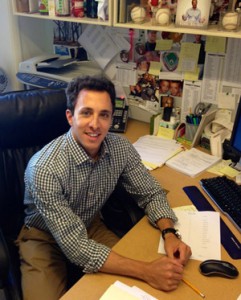The following “Six Questions” short interview with Andy Shiffman, Director of Basketball Operations at Priority Sports & Entertainment, was conducted by our Contributing Writer, Steven Swick. Andy currently assists in the representation of NBA players Bradley Beal, KJ McDaniels, Nick Young, and Gordon Hayward. Connect with Andy on LinkedIn and Twitter.

1. Prior to becoming an agent, you were able to intern with both the New York Knicks and Milwaukee Bucks. What was your process like in getting those opportunities? And, how has that experience helped you?
Both of these opportunities are the result of networking and persistence. I kept in touch with the Knicks’ human resources department for over a year, so by the time the interview process started, it was just a formality for me. As for my time with the Milwaukee Bucks, already living in Milwaukee at the time certainly helped. I kept in touch with their front office during my time in law school, remained persistent, and was willing to prove myself. Both experiences led me to build great relationships and gave me a feel for the ins and outs of running a professional basketball team.
2. Most agents, or aspiring agents, debate between going to business school for an MBA (or related graduate degree) or law school for their J.D. You chose to get your law degree from Marquette and worked as an attorney in Memphis, TN for a few years. How much does that help or dictate what you do as an agent?
I would like to preface my answer by first saying an MBA or J.D. is by no means necessary for one to become an agent; however, both give you an added niche and further understanding of the business side of the agent industry. Practicing law is not an integral part of my daily responsibilities to my clients. However, the skills I learned in law school and experiences I gained while practicing law come into play almost every day.
3. How much of your time in a typical week is spent working in Priority Sports’ office compared to your home and travelling for work?
In this industry there is the perception that agents spend their time going from game to game, schmoozing with the athletic elite. For me, most of my time is spent in our offices in Chicago. Traveling is definitely a part of my job as an agent, but I get more work done for my clients when I’m in my office either on the phone or at my computer.
4. In your opinion, what are the three most essential skills for being a successful agent?
A strong work ethic, personality, and persistence. In this industry, agents have to be willing to go above and beyond for their clients if they want to be successful. A strong and relatable personality can open many doors for an agent in the world of recruiting and building relationships. Persistence is key. Within reason, agents have to have a willingness to never take no for an answer. Always remember though, there is a fine line between being persistent and being over-bearing.
5. How do the requirements for representing a player in the NBA differ from FIBA requirements?
The NBA Players Association requires annual dues of $1,500 as well as a completed and approved application to become an NBPA-certified player agent. FIBA requires a completed and approved application, and about $1,000, if the applicant is already licensed by the NBPA. If the applicant is not licensed by the NBPA, then FIBA also requires the successful passing of a test, along with the fee and paperwork.
6. What advice would you give to aspiring sports/entertainment business professionals who want to position themselves to work in the agency world?
Surround yourself in the sport that you want to work in. If it’s basketball, eat, sleep, and breathe the business of basketball every day. Once you have that knowledge base, find a way to differentiate yourself and create a niche. There is no one right way to break into this industry; everyone will give you different advice based on their own personal experiences, but do not take that advice as conclusive. Use that advice as a resource for creating your own path into the industry.
